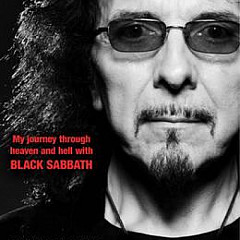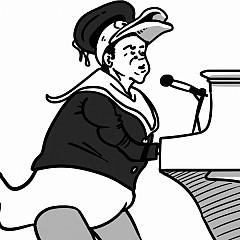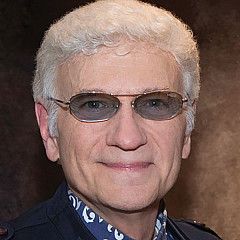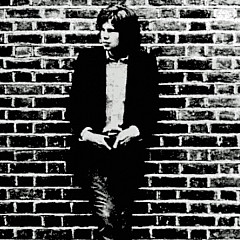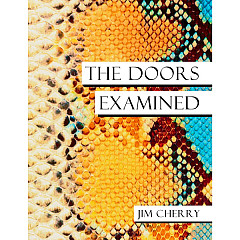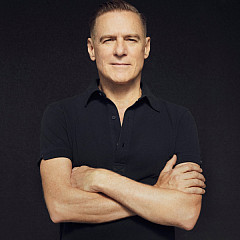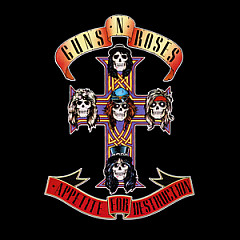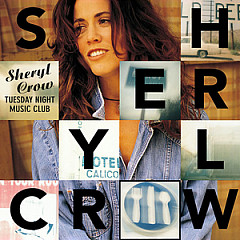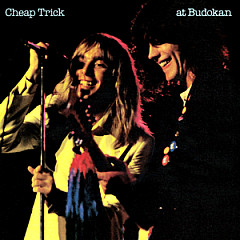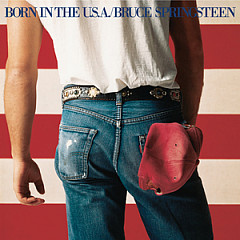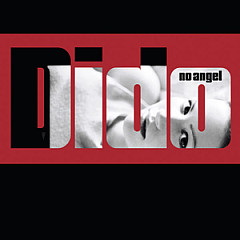
Ringo isn't the only drummer with an all-star band. Members of Leslie Mandoki's Soulmates have included Greg Lake, Chaka Khan, Ian Anderson, Steve Lukather, Jack Bruce, Peter Frampton, Nik Kershaw and Eric Burdon. The current iteration, which plays the Beacon Theatre in New York City on January 29, includes Nick Van Eede (Cutting Crew), Bobby Kimball (Toto), Chris Thompson (Manfred Mann's Earth Band), John Helliwell (Supertramp), Randy Becker and Bill Evans. That means you'll hear tracks like "Blinded by the Light," "The Logical Song" and "(I Just) Died in Your Arms" and "Hold The Line." But before all that, there was this - that's Leslie in the green.
So who is this guy, and how did he end up doing Russian dancing in a Europop outfit?
Mandoki fled Hungary in 1975 and made his way to Munich after an unplanned stop at a refugee camp in Nuremberg. He made a deal with label owner Ralph Siegel, who let him use his studio if Leslie performed in his Eurovision Song Contest group Dschinghis Khan, where six members danced around in a rainbow Mongol motif with not an instrument in sight. Mandoki describes this time as "excruciatingly unpleasant."
Relocating to America, he became a prolific session musician and producer. This is where met many of his future Soulmates, including Kimball, Thompson and Chaka Khan. The group played their first concert in 1994 at the Sziget Festival in Budapest, and released their first album in 2002, with songs written by Mandoki. Every so often, this collective gathers at Mandoki's home outside of Munich, where they work on music and enjoy the good company - no management types are allowed, and there are no contracts.
 Carl Wiser (Songfacts): This will be your first performance of the Soulmates in America, correct?
Carl Wiser (Songfacts): This will be your first performance of the Soulmates in America, correct?Leslie Mandoki: It's the very first public appearance. We played two private concerts: one in Detroit a couple of years ago featuring your Chaka Khan, and we also played once at a corporate, invitation-only gig in Miami. But it's our very first regular concert, and we are very pleased and proud and privileged to touchdown in the Beacon in New York.
Songfacts: What songs are you planning to play?
Leslie: We always play a mixture of our own original songs that we've been writing together for 25 years now. It's the same idealism and craftsmanship we had as kids in the '70s, the kind of long jazz rock, progressive rock type of songs. And, of course, when you have two legendary members of Supertramp, you play Supertramp classics. When you have the voice of Toto, Bobby Kimball, you do those songs. When you have Chris Thompson of Manfred Mann, of course you do Manfred Mann classics.
So it's always a mixture, but it's not a nostalgia thing. It's about idealism and fresh new stuff as well.
Songfacts: How do you work up the arrangements on famous songs like "Blinded by The Light"?
Leslie: Our late, great friend Greg Lake of Emerson, Lake & Palmer, when we were rehearsing, he said it was the best band of the world. Everybody knows those classics, so there are the harmony sheets and the written music sheets, but no one looks at them. I have a big studio, which is where we rehearse, as well, and we just play and find new ways in the production. So we just try new ways for interpretation. We improvise the classics, and then we say, "OK, that was a great emotional way to look at them."
This goes for songs like "Blinded by The Light" or "Locomotive Breath," or for songs nobody has heard of. We always find a very personal interpretation.
Songfacts: Which of these songs was the most challenging to interpret?
Leslie: In the last 25 years, the most challenging was giving the Emerson, Lake & Palmer classic "Lucky Man" a sort of new attitude.
There's often a beautiful way to get Ian Anderson's flute playing into the whole thing, like "Blinded By The Light" with flute. We did "Smoke On The Water" with Peter Frampton on the guitar, Jack Bruce on bass, Manfred Mann on the synthesizer, Jon Lord on the Hammond. But Ian Anderson was leading with the flute on top of Peter Frampton on guitar. Jack Bruce was singing, and Bobby Kimball of Toto and Chris Thompson of Manfred Mann did the background vocals. So this gives you kind of view how we're doing it.
Songfacts: When all this is going on, you are essentially the band leader. How much of a role do you have when you're working up these arrangements?
I was just a dreamer behind the iron curtain. I was the leading musical voice of the student opposition, the student movement against communism. I escaped the dictatorship and I came to the West and I was touching down at the refugee camp, and they asked me what the hell I want to do with the future. And I said, "I want to play with Ian Anderson of Jethro Tull and Jack Bruce of Cream. This was my vision, my dream. I took from my father, who was a great musician, this line that he said to me, "Son, you'd better live your dreams and don't dream your life."
And therefore, I don't want to put myself in the center. But of these guys, yes, I'm the bandleader. I will come up with a setlist and come up with a buildup of the song and how we're doing it. But it's not about me, it's about us.
These nights when we are playing are about what is uniting us. The whole day, you'll hear what is dividing us, so we're playing music that is uniting us.
Songfacts: Your studio is in Germany, right?
Leslie: Yes.
Songfacts: When was the last time that the Soulmates gathered there to work?
 Leslie: It was in August this year. We played a big concert there. We returned to the Sziget in Budapest, which is where we opened 25 years ago, it was our first big concert. We returned for the anniversary, and after that we were just hanging out in my studio. We played and recorded new stuff to start a new album, and we had a beautiful time.
Leslie: It was in August this year. We played a big concert there. We returned to the Sziget in Budapest, which is where we opened 25 years ago, it was our first big concert. We returned for the anniversary, and after that we were just hanging out in my studio. We played and recorded new stuff to start a new album, and we had a beautiful time.The studio is by Lake Starnberg nearby Munich. It was like old hippie times. Our music is like a love letter to the audience. It's not a text message.
Songfacts: How many musicians were at this gathering?
Leslie: Well, the last time, we had the whole horn section, so Randy Brecker, the genius from New York City, who won 13 Grammys. Bill Evans, the Miles Davis of saxophone. John Helliwell on alto saxophone of Supertramp. Till Brönner, the young German, on trumpet. And we had Mike Stern with us on guitar, Cory Henry from New York on the keyboards. We had Ian Anderson with us, we had Chris Thompson. Bobby Kimball was there from Toto, and Nick van Eede of Cutting Crew. So this was the gang we played with that night.
Songfacts: This sounds like kind of a musical Utopia. Would you be able to describe not so much the recording process, but what you guys do in those days when you're there hanging out together by the lake?
Leslie: Well, my house is around one-and-a-half miles up the way from the studio itself, so we sit by the water and we cook there. You know, musicians are cooks, because we are traveling so much and then we are hanging out in great restaurants. We learn from great cooks throughout the whole life, so we are all pretty good cooks. We talk about life, about politics, about the future.
If you have a picture of Woodstock and you just transfer it to today, it's these long nights and we talk and then we hang out at breakfast or by the water in the summer. And then we just take a little boat ride and go swimming. So it's just having great times, and, of course, we talk a lot about music and what music means. Sometimes even about technicalities - how the recording process is changing and how the digital age is changing our lives. We talk about how the recording industry has changed from vinyl to CD to download to streaming, and how we are getting more independence in the way we create.
A couple of years ago, Jack Bruce was telling the story that "Sunshine of Your Love" almost didn't get recorded because the record company turned down the demo. They were sneaking about in the late night to the studio illegally, and with a stolen key, they opened it and they recorded it.
So big great rock stories are coming along. How beautiful it is when Bill Evans and Mike Stern are telling the stories about Mike's babies, and everybody's listening. These are very precious moments.
We also talk about politics. How important it is being idealistic, how important is it to talk about things that united us and mutual values and the substance of freedom. That's why call our concert series On the Wings of Freedom.
Songfacts: Who is the best cook?
Leslie: Well, this is difficult. I think each of us is really a good cook.
Songfacts: You really don't like to play favorites.
Leslie: I know. Because every night someone else took the lead in the kitchen.
Songfacts: Leslie, what did you learn from Greg Lake?
Leslie: That music is great when there's love in the room. He was creating love in the room and it was creating beautiful music. He always let us feel that he loved what he was doing with us.
Leslie: How much I hate to be a pop star. It was a misunderstanding. They asked me about Grand Prix, and I thought it was a car race, Formula One.
I was an intellectual from the music academia and the musical leader of the student opposition movement against communism, and I ended up in a pop band with a #1 record. This was crazy enough. So I learned that you should never hurt the balance of content and format.
Songfacts: What about Ian Anderson? What did you learn most from him?
Leslie: Ian is one of the closest friends, and he's the strongest intellectual personality in the rock and roll industry. He is politically, emotionally, musically, and in the way he maintains his own personal life and family. So he is the most influential person to me. I feel myself extremely privileged and honored that I can call him a close friend.
I've been playing with him 25 years. One of his greatest sayings was, "We are all aging differently." With this kind of simple-sounding sentiment, it was very deep cutting. Ian is an excellent source for all this intellectual and emotional beauty, what makes our music to be what it is.
I love his humor. I'm Hungarian, he is Scottish, and we realized about 25 years ago that we both have the same ironic humor.
 Songfacts: As a person who speaks multiple languages and is a drummer and a vocalist and a lyricist, I'd like to hear about how you think in English versus Hungarian versus German, and how that affects your songwriting.
Songfacts: As a person who speaks multiple languages and is a drummer and a vocalist and a lyricist, I'd like to hear about how you think in English versus Hungarian versus German, and how that affects your songwriting.Leslie: Well, 95 or 98 percent of my songs I write in English, and the first step to write a song is always the hook. So, "What a day for the daydream, with a ride to the secrets of life," or "Last day of summer..." So there's always the melody and the lyrical main hook.
And if you ask me to compare it, Hungarian is for me the language where I'm coming from, and the Hungarian language and the literature was teaching me the practical aspect of this very poetic way to describe things. It is the language I speak with my children, but I'm not writing songs in Hungarian.
When I'm not on the road, my life takes place in German, and every now and then I write in German. The German language has for me a rather philosophical aspect. I really, really love it. There's a preciousness of the language and the philosophical way.
And English is really the language of rock music. My Hungarian and my German friends would disagree, because they think that their mother tongue is the way, but I think English is the natural-born language for rock music.
December 18, 2017
More at mandoki-soulmates.com
More Song Writing

